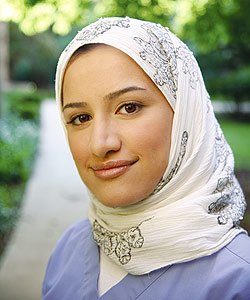 |
Chick lit novels rarely heat up the black market. But that’s what Girls of Riyadhdid when it débuted two years ago in Saudi Arabia. The first novel from an unknown dental student named Rajaa Alsanea, Girls follows four 20-something women whose experiments with premarital sex and booze are at odds with traditional Islamic society. Alsanea, 25, who is now studying endodontics at the University of Illinois at Chicago, releases the English translation of her much-buzzed-about book in July. She lives with her brother and sister-both orthodontics students-in River West.
Q: Your book was a hot commodity on the black market in Saudi Arabia. Was it officially banned there?
A: I think I was a coward because I just expected that it might be banned, and I didn’t really work on getting permission from the Ministry of Information. I did what all other famous writers do: they go and publish in Lebanon. Everybody started ordering it online and getting it by mail. At a certain time the photocopy was worth $500. People can even download it on their cell phones. It started spreading. Then I applied for the permission, and I got it.
Q: When a main character, Sadeem, goes to London, she sheds her traditional outfit on the airplane. Do you do that when you come to the United States?
A: I used to. We all used to wear our T-shirts and jeans, and we used to cover with this abaya on top. Nowadays I don’t. I started wearing the Islamic uniform two or three years ago. I had certain experiences that made me want to become a better Muslim.
Q: Do you think American readers will be surprised at how much they have in common with these girls?
A: Kind of, yes, because I get funny questions like, “Do girls in Saudi do their nails like girls here? Do you have makeup?” Some people think that we live like girls in Afghanistan or Sudan. They think that the girls there don’t have any kind of freedom, that they’re so inferior to men. And when reading this, they’ll feel like girls are the same anywhere in the world. They all go through the same heartbreaks, the same dreams.
Q: And, apparently, they share a love of text-messaging.
A: Here, it’s not as much as Saudi. People make fun of me here because I still text-message my friends in Saudi all the time.
Q: The book drew comparisons to Sex and the City. Are you planning to adapt it for TV?
A: A lot of Arabic TV channels tried to buy it to make it a TV series, and others wanted to produce it as a film. I didn’t agree to any of them so far. I’m kind of taking notes about those kinds of movies that talk about life in Arabic countries. When I went to Babel a few months ago, I thought that Brad Pitt did a good job.


